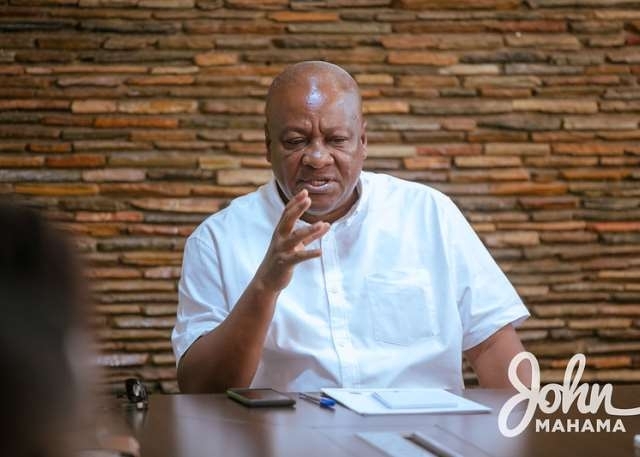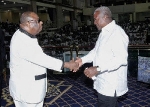Resetting Ghana together: A call to unity of purpose for dear nation
 John Dramani Mahama
John Dramani Mahama
On Saturday, December 7, 2024, Ghanaians went to the polls to elect a president and 276 members of parliament.
Touted as a high-stakes election, the occasion was preceded by numerous calls for a peaceful, fair and transparent process to solidify Ghana’s position as a beacon of democracy.
Despite a few skirmishes and isolated acts of lawlessness that must be addressed with the full force of the law, the process unfolded largely as the world and all Ghanaians had hoped: a testament to Ghana’s stability and democratic maturity.
With the elections over, we must now face reality. Undoubtedly, the challenges facing Ghana are monumental, requiring an unprecedented collective effort to overcome.
They require us to rally around the new leader and his vision of resetting Ghana to initiate and implement bold solutions that will lift our citizens out of poverty, address the yawning gaps in education and give many people access to quality and affordable healthcare.
These and the general task ahead demand not just action but unity, clarity of purpose and an unwavering commitment to the national interest.
Landslide victory
It is heartwarming that Ghanaians, recognizing the scale of the moment, delivered a clear mandate to the National Democratic Congress (NDC) and President John Dramani Mahama (JM).
This electoral verdict, characterized by a comfortable majority in Parliament and an unprecedented presidential lead, signals a call for bold, productive decisions that transcend partisanship and pave the way for a better future.
Having known JM for this long, I am convinced he is aware that this mandate is not a license for complacency or self-serving governance. The evidence and consequences of that attitude are glaring.
Instead, the landslide victory for the NDC is a call to action—a solemn trust to make choices that advance the common good.
It is imperative that the NDC government steers clear of the pitfalls of over-bloated administrations, clandestine suppression of businesses and stifling of dissent, especially in the press.
Instead, this moment must be seized to lay down the building blocks for a collaborative and inclusive national agenda, fostering dialogue and deepening democracy in ways that will stand the test of time and reestablish JM and the NDC as the party that lays the critical foundations for Ghana’s prosperity and growth.
Arrest poverty levels
The electorate’s overwhelming endorsement of the NDC and JM was rooted in clear promises of transformation.
Central to these promises was a commitment to improve lives, particularly for the most vulnerable in society.
Social democracy, the ideological cornerstone of the NDC, places people at the heart of development.
It prioritizes equity, inclusiveness and the eradication of poverty.
This philosophy must now guide every policy, decision and initiative undertaken by the government.
It is instructive to note that poverty levels rose significantly over the past eight years, according to World Bank data. The bank said 6.9 Ghanaians were living in extreme poverty in 2024, up from 2.99 million people in 2023. The World Bank predicted that poverty levels will deteriorate to 31.5% next year, the highest since 2000.
These are the consequences of lopsided policies that hurt the economy and the citizens over the period and now require deliberate efforts to stop the trend and make lives better for all, not a few.
A government that prioritizes the poor is not only morally sound but also economically astute.
Addressing issues such as access to education, water, healthcare and sustainable livelihoods for the marginalized will not only reduce inequalities but also unleash the full potential of millions, driving economic growth up and fostering national cohesion.
As Ghana stands at a crossroads, the path forward must reflect these values, ensuring that power is decentralized and resources are equitably distributed.
Ensuring accountability
With the mandate also comes accountability, a cornerstone of effective governance.
The people of Ghana have placed their faith in the NDC to deliver on its promises. To engender and sustain this trust, the government must establish a culture of transparency and responsibility.
Accountability is not just a tool for good governance; it is a means of empowering the electorate, restoring confidence in public institutions and fostering a sense of collective ownership of national progress.
Every Ghanaian deserves to know how public resources are being utilized, how decisions are made and how those in authority are held to account.
Mechanisms for open governance, including regular briefings, independent audits and robust parliamentary oversight, must be prioritized.
This will not only reinforce public trust but also inspire a new standard of leadership across all levels of governance.
The challenges facing Ghana cannot be solved by the government alone.
They require the collective effort of all stakeholders, including civil society, private enterprises, traditional authorities and ordinary citizens.
This is a time for bridging divides, be it political, ethnic, and ideological to build consensus on national priorities.
President-elect Mahama and the NDC must lead this charge, fostering a culture of dialogue and collaboration that transcends partisan interests.
Clamping down on dissent or sidelining opposing voices would only deepen divisions and stifle progress as we have witnessed in recent times, partly contributing to the electoral revolt delivered on December 7.
Instead, the government must embrace criticism and alternative perspectives as opportunities for growth and refinement.
Constructive engagement with all segments of society is the hallmark of a mature democracy, and Ghana’s democracy must be deepened, not diminished.
Big expectations
The people of Ghana are looking to the NDC government to deliver a better life. 7
This expectation is not abstract—it is a yearning for tangible improvements in daily living.
Affordable housing, reliable energy, accessible healthcare, quality education and decent jobs are not just campaign promises but fundamental rights that every Ghanaian aspires to enjoy.
Meeting these expectations will require bold, innovative and often tough decisions.
Tackling corruption, enhancing revenue generation, improving public sector efficiency and ensuring value for money in government projects are critical areas that demand urgent attention.
The electorate has given the government the political capital to make these tough choices.
That capital must be used wisely, with a focus on long-term benefits rather than short-term gains.
As the NDC and JM embark on this journey, they have a unique opportunity to leave a legacy of hope and progress.
This is a defining moment not only for the party but for the nation. The decisions made today will shape Ghana’s trajectory for generations to come and I am confident that President-elect Mahama will deliver.
By staying true to the principles of social democracy, prioritizing the needs of the poor, fostering collaboration and upholding accountability, the government can build a Ghana that works for everyone.
While at it, President-elect Mahama, his Vice-elect, Prof. Jane Naana Opoku-Agyemang and the entire NDC will require the unalloyed support of all Ghanaians, including.
Now is the time to drop partisanship and rally behind the red, gold and yellow flag to brighten the Black Star of Africa and bring enduring prosperity to all.
Let us join hands to reset Ghana into a nation that delivers for all of us, not a few.
By Alhaji Seidu Agongo
The writer is a philanthropist and founder of the collapsed Heritage Bank Ghana Limited
Source: Alhaji Seidu Agongo
Trending News

East Legon accident: See details of suspect driver Elrad Amoako's 6-month sentencing
23:00
Supreme Court: Anti-gay bill judgment expected today
11:13
December 7 election was a people’s revolution against an insensitive gov't – Ato Forson
14:44
Bawumia attends burial of late Ashanti Regional Chief Imam in Kumasi
17:21
John Dumelo begins MP duties ahead of swearing-in
12:26
We can’t repeat the mistakes of NPP; let's be different – Ato Forson to NDC
04:03
EC 'useless' press confab targeted at diluting NDC's parliamentary strength-Omane Boamah
17:58
We pray there will be no negative narratives under your gov’t – Duncan-Williams to Mahama
06:27
eTranzact and Npontu Technologies launch Ghana’s first AI and payments technology accelerator for Ghanaian start-ups
14:17
Increase betting tax to 50% to protect youth: ICS to President-elect Mahama
17:06




